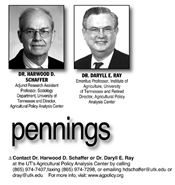|
Farm Groups Have A Change Of Heart About Change In Climate

Farmers are often frustrated with the attitudes of urban dwellers who by their words or actions indicate that they really do not understand the issues that the rural/agricultural community faces on a daily basis.
One image, in particular, stands out for us. It was a publication of the Occupational Safety and Health Administration warning farmers that “when floors are wet and slippery with manure, you could have a fall.” Farmers felt the publication was dismissive of their intelligence and a waste of money.
That image came to mind recently when we read that urban dwellers feel that farmers do not understand the impact of their practices beyond the farmgate, particularly when it comes to global warming and the release of carbon dioxide and methane that results from agricultural operations.
For years a large segment of the agricultural community, led by one of the major farm organizations, has resisted all efforts to identify ways to modify agricultural practices that result in the release of methane and carbon dioxide into the atmosphere. The fear has been that if agricultural admits that some of its practices contribute to climate change, these practices will become subject to federal regulations, an outcome they wanted to avoid at all costs.
As a result, much of the work on climate change by farmers has been limited to a small group of ecologically-oriented producers who see themselves as stewards of the earth and the parcel of land they farm. They want to farm in a way that is responsible to the future of all people as well as those who will inherit their land.
But attitudes among farmers towards climate science may be changing according to Ellyn Ferguson in a Roll Call article titled, “Farmers are coming around on climate change: Flooded fields, persistent droughts or ravaging wildfires are giving many a change of heart” (https://tinyurl.com/ydcyh2tm).
Ferguson writes, “Major farm and livestock groups held a press conference in February to project a united voice on an issue they’ve long avoided. The coalition leaders said they wanted to join the fight against climate change rather than remain cast as villains avoiding the responsibility.”
Certainly, the flooding across a wide swath of the US Midwest last year, an event consistent with climate change theory, forced many to reconsider their long-held position opposing any discussion of climate change.
This shift in attitudes, if it gains widespread support across the country’s farmland, would represent a significant change from the time when the mention of climate change was as unacceptable as swearing in church. It may signal a turnaround from a decade-and-a-half ago when farmers were talking about the trading of carbon credits. In a carbon credit trading system, those releasing greenhouse gases like carbon dioxide and methane would negotiate a price with farmers to store an equivalent amount of carbon in the soil. Eventually this concept was quashed by a growing resistance to any discussion of climate change by much of the farming community, so any change we now see is a welcome sign.
Ferguson points out the need for such a change writing, “The EPA’s 2018 greenhouse gas inventory says the U.S. agriculture sector accounted for nearly 10 percent of the nation’s greenhouse gas emissions, up from 9 percent in 2017. Overall, the EPA found greenhouse gas emissions in the U.S. rose by 2.9 percent from 2017 to 2018 because of increased fossil fuel use.”
Ferguson also makes a connection between the Green New Deal released by Ocasio-Cortez and Markey and the change that we are seeing among some agricultural leaders long-resistant to acknowledging any connection between agricultural practices and climate change. The release of the Green New Deal put some farm leaders in a defensive position, and it seems like they are looking for a way forward.
One would expect that while this attitudinal change is welcome, much of the work will be done by or build upon the work of those farmers who year-in and year-out have been environmentally oriented and have identified ways to reduce the impact of their operations on climate change. ∆
DR. HARWOOD D. SCHAFFER: Adjunct Research Assistant Professor, Sociology Department, University of Tennessee and Director, Agricultural Policy Analysis Center
DR. DARYLL E. RAY: Emeritus Professor, Institute of Agriculture, University of Tennessee and Retired Director, Agricultural Policy Analysis Center
|
|